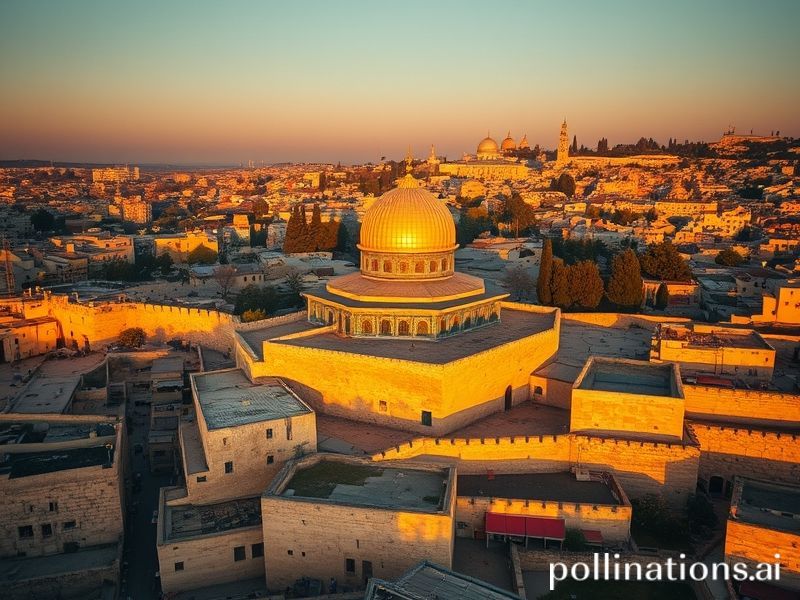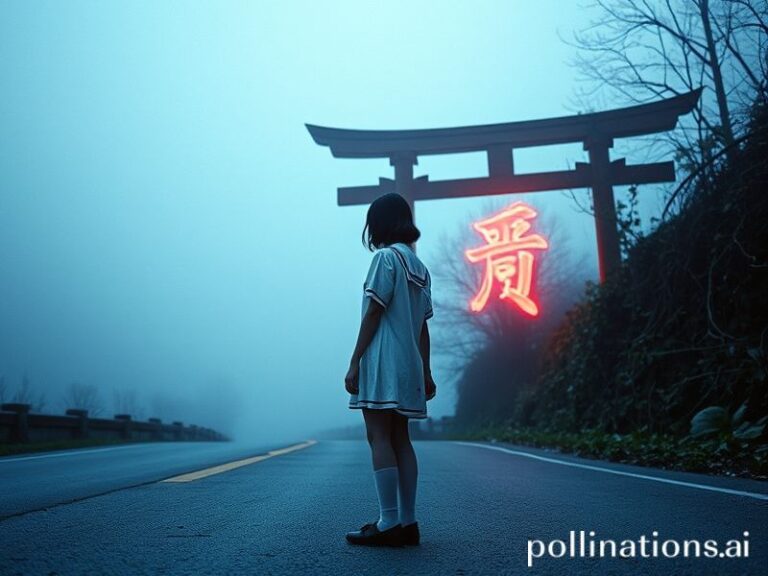Jerusalem: The World’s Most Overqualified Flashpoint—Why Every Capital Wants a Piece (and Peace) of the Holy City
Jerusalem—population 900,000, contested percentage roughly 100—has once again reminded the world that some cities refuse to behave like mere dots on a map. While the rest of us argue over parking tickets, this limestone labyrinth is busy hosting a millennia-old multiplayer grudge match with no respawn button.
From an international standpoint, Jerusalem is the diplomatic equivalent of a hand grenade rolled into a dinner party: everyone pretends to keep calm while mentally calculating exit routes. The United States moved its embassy in 2018, effectively yelling “shotgun” in a car full of bickering cousins; Guatemala followed, presumably for the frequent-flyer miles. Meanwhile, 138 countries at the UN still refuse to recognize Israeli sovereignty, proving that the General Assembly can agree on something—just nothing useful.
Global implications? Start with the obvious: any peace plan that omits Jerusalem is like a cookbook without salt—technically edible, but why bother? The Abraham Accords sidestepped the city entirely, and those treaties now wobble like a shopping cart with one wonky wheel. Gulf states watch Israeli police raids on Al-Aqsa the way teenagers watch horror films: through parted fingers, secretly thrilled it’s not their mosque. Europe, paralyzed by Holocaust guilt and burgeoning Muslim electorates, has mastered the art of the simultaneous frown, issuing statements so balanced they could be used to level furniture.
Economically, Jerusalem is a start-up nation wrapped around a black hole. Venture capital flows into the city’s tech sector—cyber-security firms ironically protected by the very tensions they monetize—while a few tram stops away, shopkeepers in East Jerusalem report incomes lower than the Dead Sea’s altitude. Tourism should be recession-proof: where else can you see God’s résumé carved in stone? Yet pilgrims often cancel when the nightly news resembles a Michael Bay deleted scene. The global faithful respond by live-streaming the Wailing Wall, because nothing says “ancient spirituality” like buffering.
China, ever the opportunist, offers to host peace talks, having discovered that Palestinian-Israeli animosity is one Middle-East export it can’t reverse-engineer cheaply. Russia, nostalgic for superpower relevance, dispatches diplomats like seasonal postcards. Both powers know that controlling the narrative of Jerusalem grants you the geopolitical equivalent of a blue checkmark—prestige without the sewer bill.
And then there’s the theological stock exchange. American evangelicals track Jerusalem’s status like crypto, convinced each stone moved inches us closer to Armageddon—finally, a market correction that wipes out everybody. Sunni and Shiite powers bicker over guardianship of holy sites the way divorced parents fight for weekend custody, except the child is a building that’s been “18” for 1,400 years.
What makes the city irresistible is also what makes it lethal: memory. Every cobblestone is a citation in someone’s PhD thesis on why the other guy should die. Archaeology digs here are basically slow-motion evidence planting; a coin from King David’s era is a weapon of mass instruction in the wrong academic hand. UNESCO lists heritage sites faster than teenagers block parents on Instagram, yet the listing achieves roughly the same deterrence.
Still, Jerusalemites persist. They barter, argue, brew coffee strong enough to carbon-date teeth, and occasionally intermarry, proving that daily life is the dark horse candidate in every ideological race. The city’s true international significance may be its ability to embarrass the rest of us: while diplomats draft clauses no toddler would accept, civilians ride the same light rail, praying the electricity stays on longer than the ceasefire.
Global lesson? If humanity can’t share three sacred hills, good luck sharing oceans, bandwidth, or a climate. Jerusalem isn’t a problem to solve; it’s a mirror held up to a species that never learned to take turns. Until further notice, the international community will keep issuing statements, the pot-shots will keep issuing from alleyways, and the rest of us will refresh our feeds, grateful we can close the app and go to bed—somewhere considerably less historic, and mercifully less honest.







